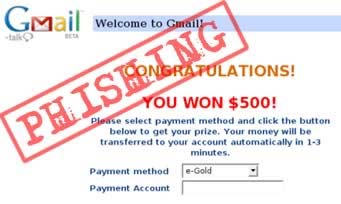Security experts warn Gmail users to be cautious as a recent phishing campaign posing as this email service has been launched.
According to experts, this is indeed a large-scale email phishing campaign.
Typically, the content of the emails used in this fraudulent campaign impersonates the free email service provider Gmail, notifying users that they have won a prize worth $500 and asking them to click a hyperlink to claim their reward.

‘You won $500! Gmail congratulates you!
CONGRATULATIONS!
YOU WON $500!
Gmail gives members random cash prizes. Today, your account is randomly selected as one of 12 top winners who will receive cash prizes from us. Please click the link below and follow the instructions on our website. Your money will be paid directly to your e-gold, PayPal, StormPay, or MoneyBookers account.’
Gmail congratulates you on winning a prize worth $500!
Congratulations!
You have won a prize of $500!
Gmail randomly selects members to award prizes. Today, you have been selected to be one of the 12 recipients of our award. Please click the link below and follow the instructions to claim your prize. Your reward will be transferred directly to your PayPal, StormPay, or MoneyBookers account.
However, when users click on that link, they are directed to a website that reports an error in the money transfer and requests users to re-enter their bank account details and pay a membership fee of $8.60.
“Of course, that email is not from Gmail, and the $500 prize does not exist. Anyone who tries to follow the instructions to claim the prize becomes a victim of online scammers,” confirmed Graham Cluley, senior technology consultant at Sophos.
Shifting Trends
This newly discovered phishing attack campaign is another clear example of the changing trends in online fraud. Scammers have now shifted to targeting specific individuals and carrying out attacks that, while still large in scale, are not as widespread as before.
The reason for this shift in trend is partly due to security companies providing more information to users and the heightened awareness among users themselves.
As a result, scammers have moved towards smaller, targeted attacks aimed at maximizing illicit profits.
Sophos recently released a report indicating that over the past year, 58% of users received a phishing email every day.
Hoang Dung


















































